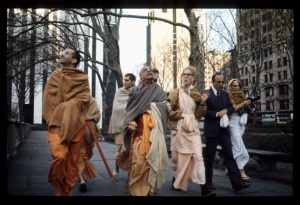CC Madhya 17.39

A.C. Bhaktivedanta Swami Prabhupada
TEXT 39
yatra naisarga-durvairāḥ
sahāsan nṛ-mṛgādayaḥ
mitrāṇīvājitāvāsa-
druta-ruṭ-tarṣaṇādikam
SYNONYMS
yatra—where; naisarga—by nature; durvairāḥ—living in enmity; saha āsan—live together; nṛ—human beings; mṛga-ādayaḥ—and animals; mitrāṇi—friends; iva—like; ajita—of Lord Śrī Kṛṣṇa; āvāsa—residence; druta—gone away; ruṭ—anger; tarṣaṇa-ādikam—thirst and so on.
TRANSLATION
“‘Vṛndāvana is the transcendental abode of the Lord. There is no hunger, anger or thirst there. Though naturally inimical, human beings and fierce animals live together there in transcendental friendship.’”
PURPORT
This is a statement from Śrīmad-Bhāgavatam (SB 10.13.60). After stealing the cowherd boys and calves of Śrī Kṛṣṇa, Lord Brahmā kept them asleep and hid them. After a moment, Brahmā returned to see Kṛṣṇa’s condition. When he saw that Kṛṣṇa was still busy with His cowherd boyfriends and animals and was not disturbed, Lord Brahmā appreciated the transcendental opulence of Vṛndāvana.